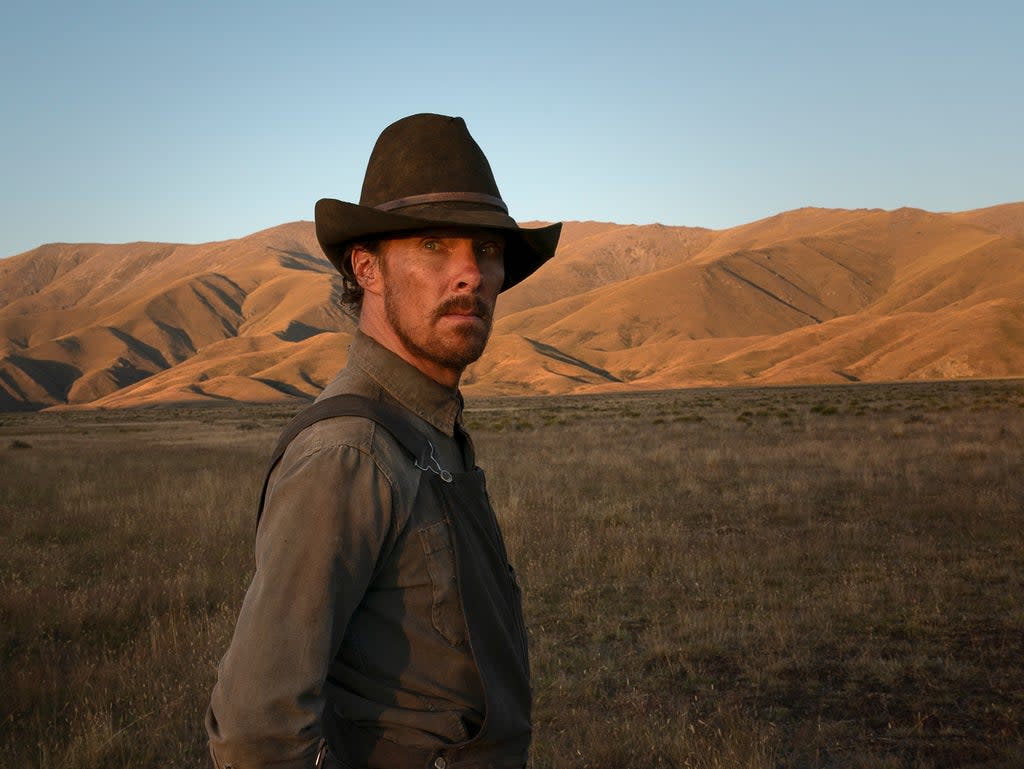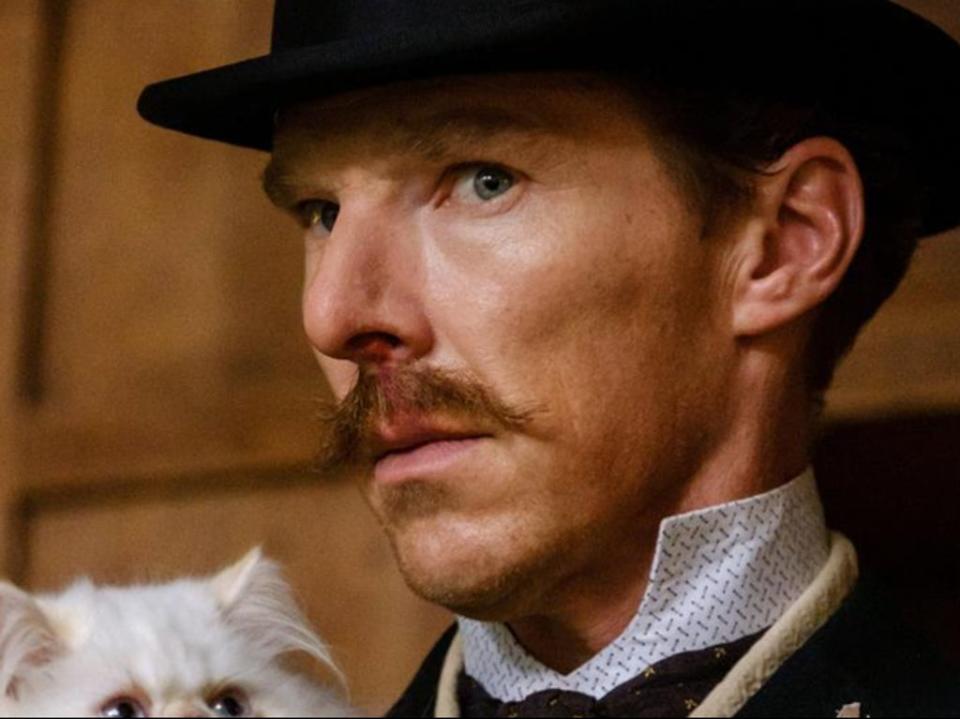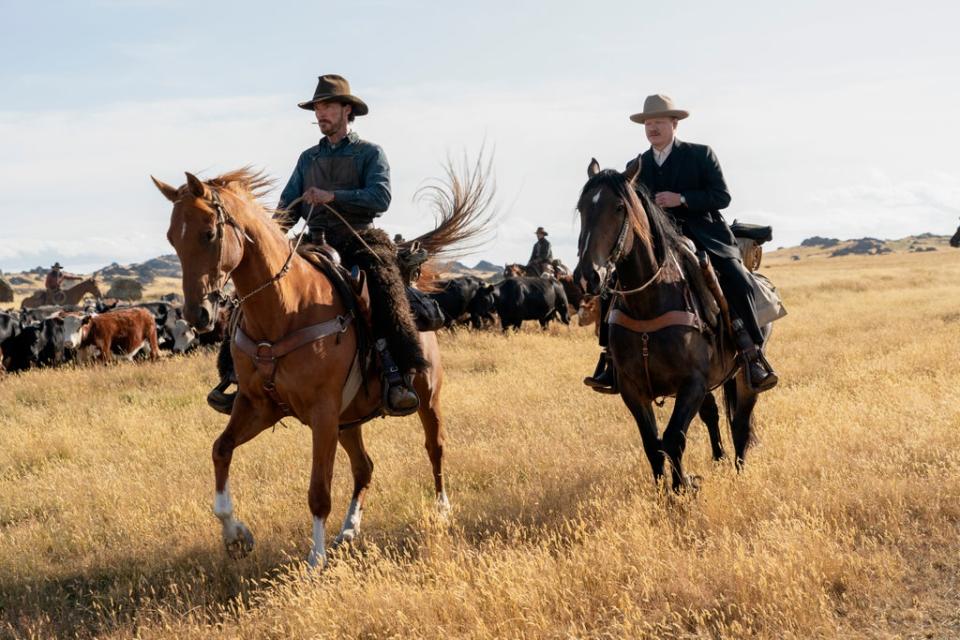Will Benedict Cumberbatch finally win an Oscar?

- Oops!Something went wrong.Please try again later.
These are balmy times for Cumberpeople. Their beloved Benedict Cumberbatch is starring in three new movies, and his performances in all of them could easily win awards. It is presumably thanks to Covid that the films are arriving all at once, like the proverbial London buses. Each reveals a different side of Cumberbatch, showcasing variously his comedic charm, his sensitivity and even, most unlikely of all, his blunt machismo. One is a spy movie, one is a fey Victorian-era biopic and the other a western. The characters he portrays have nothing in common and yet he seems born to play them all.
Cumberbatch was nominated for an Oscar for portraying Second World War codebreaker Alan Turing in The Imitation Game (2014). Since then, he has racked up his share of credits in blockbusters (Marvel’s Dr Strange, Star Trek and Hobbit movies) without doing anything for the big screen that has remotely matched his work for TV (Sherlock, Patrick Melrose, Parade’s End, etc, etc) or the stage. Some of his films have even been surprisingly clunky. There was very little voltage at all (as every reviewer punned) about The Current War (2017) in which he starred as inventor Thomas Edison. The disgraced producer Harvey Weinstein had interfered with the wires behind the scenes, tinkering so heavily in the editing that the film’s director Alfonso Gomez-Rejon came close to blowing a fuse, but that didn’t explain the lead actor’s stilted American accent or his unusual lack of charisma.
Nor was Cumberbatch’s uncanny performance as WikiLeaks whistleblower Julian Assange in Bill Condon’s The Fifth Estate (2013) greeted with as much acclaim as might have been anticipated. With pale skin and lank white hair, he looked very like Assange and captured the character’s crusading zeal, narcissism and persecution complex, but the film itself was too scattergun to make any impression on awards voters.
Now, though, Cumberbatch is back at full throttle. The Courier, the espionage thriller, sees him behaving like one of those mischievous minor public schoolboy types that Ian Carmichael and Terry-Thomas used to play in old Boulting brothers satires (I’m All Right Jack, Lucky Jim) of the late Fifties and early Sixties. He is cast as British businessman, Greville Wynne, a louche salesman who likes a bit of an adventure. When he is asked to deliver messages on behalf of the British and American secret service to a KGB officer who’s spying for the west, he quickly agrees. The job appeals both to his patriotism and his sense of mischief.
Greville is no James Bond – and it is highly unlikely that Barbara Broccoli and Michael G Wilson will be looking to the actor playing him to take over from Daniel Craig. The glory of the performance lies in the mix of seediness and idealism that Cumberbatch brings to the role. He is the type who’ll sell you a secondhand car. His venality, gregariousness and love of alcohol help him get along famously with his new Russian contacts. However, come the hour of crisis, he is steadfast in a very British way.
Cumberbatch’s Greville is intimidated and tortured by the Soviet authorities. Back at home, he is told off very sternly by his long-suffering wife (Jessie Buckley) who suspects he has been cheating on her again. Everything about him, from his Errol Flynn-like moustache to his exaggerated bonhomie, suggests he is on the make. Cumberbatch shows us his sleazy and opportunistic side but leaves us in no doubt about Greville’s integrity. He is far more courageous than he first seems – a spiv who emerges as a tragic hero.
By complete contrast, in The Electrical Life of Louis Wain, Cumberbatch plays a repressed Victorian inventor and artist who becomes a celebrity by painting cutesy anthropomorphic pictures of cats. Again, Cumberbatch excels, but this time as an outcast in society. He is desperate for money to look after his five unmarried sisters. It’s a dysfunctional and neurotic family. Louis’ only moments of happiness come from his relationship with the governess (Claire Foy) hired to educate his youngest siblings. They are oddballs together and their romance is depicted by director Will Sharpe with real delicacy and humour. This is a deceptive film, though, which begins in stylised and high-spirited fashion but grows ever darker. Cumberbatch’s achievement is to play a neurotic and mentally unstable figure in such a sympathetic manner. He doesn’t disguise his character’s eccentricities, self-destructive behaviour or delusions. He is a pathetic and sometimes desperate figure but he is also a visionary.

Cumberbatch’s Louis Wain can hardly fend for himself in the big, bad world of the Victorians. But in Jane Campion’s 1920s-set western, The Power of the Dog, the actor is getting in touch with his inner John Wayne. He plays Phil Burbank, a laconic, physically imposing rancher who only seems content when he is out on the plains, riding horses or lassoing his livestock. Phil despises home comforts and the trappings of civilisation. He is a bully and a patriarch. He treats women with contempt. Nonetheless, he is far better educated than he lets on. The presence on his ranch of an effete younger man (Kodi Smit-McPhee), the grown-up son of his brother’s new wife, disturbs him in ways he can’t explain. Just as Wayne can’t cope with the good-looking younger cowboy played by Montgomery Clift in Howard Hawks’s Red River (1948), Phil struggles to deal with the ambivalent feelings the newcomer stirs inside him. He is torn between antagonism and attraction.
Asked at the Venice Festival press conference for The Power of the Dog about “toxic masculinity”, Cumberbatch parried the question and instead talked about the wounded nature of the rancher. “For me, the toxicity is a product of his nurture, his upbringing, his circumstances, nothing that has arrived fully fledged,” he said of Phil’s obnoxious behaviour. “He is someone who is defensive, who is anxious about everything they’ve built potentially being taken away, who is lonely, who is repressed, who is feeling isolated.”

Cumberbatch risked sounding more like a social worker or counsel pleading for the defence than an actor. Nonetheless, his technique was effective. The star was searching for a kernel of decency in a character who at first glance seems like an utter bastard. On screen, the more malevolently Phil behaves, the more apparent his own self-loathing becomes. He has buried his real feelings very deeply. Cumberbatch shows vulnerability when you least expect it. He captures his character’s growing confusion at how his initial hostility toward the younger man gives way to an extreme longing.
If you were betting on which of the three performances has the best chance of winning awards, The Power of the Dog is surely the favourite. The film has the marketing might of Netflix behind it. Cumberbatch has probably never strayed this far from his usual type before. The physicality of the performance takes you by surprise. The same actor audiences know for his roles as cosmopolitan and hedonistic aristocrats like Patrick Melrose or cerebral Baker Street detectives is playing a rugged, scowling, unwashed frontiersman.
Cumberbatch has long been considered a bankable star. Foreign distributors who generally give British cinema a very wide berth will acquire films simply on the basis of his name. Nonetheless, until now, his big screen work has been surprisingly patchy. He has excelled in some character roles, for example as the plantation owner in 12 Years a Slave (2013) or the uptight military prosecutor in The Mauritanian (2020), but he hasn’t been in the Oscar race since The Imitation Game. Now, at last, he is among the favourites and he may even end up competing against himself.
‘The Power of the Dog’ is the American Express Gala at the BFI London Film Festival, screening on 11, 12 and 17 October
‘The Electrical Life of Louis Wain’ is expected to be released later this year
‘The Courier’ is released by Lionsgate on Digital on 29 October and Blu-ray & DVD on 1 November
Read More
Monument men: The good, the bad and the ugly sides of how the Valley has been portrayed in film
Assassin, alien villain, televangelist: The many faces of Jessica Chastain
Licence to change: The challenge of modernising 007 for a post-MeToo, post-Covid world
The Midnight Bell shows Matthew Bourne’s gift for the drama of the everyday – review
The stage adaptation of Hilary Mantel’s Mirror and the Light is thrilling – review
National Gallery’s Poussin and the Dance shows a youthful look at the painter– review

